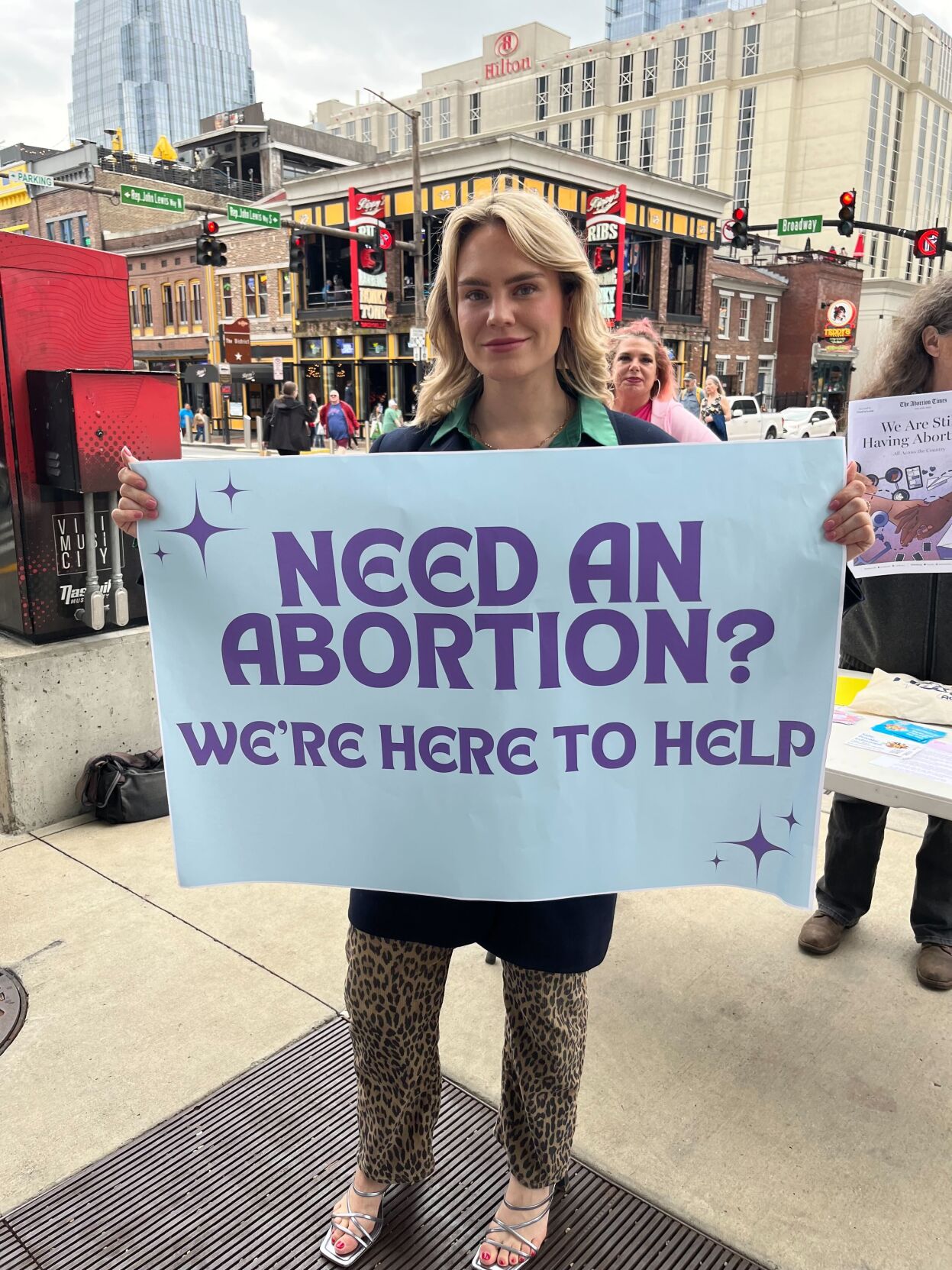
Rep. Aftyn Behn on Lower Broad, April 10, 2024
Rep. Aftyn Behn (D-Nashville) and abortion fund member and attorney Rachel Welty on Monday brought a lawsuit against the district attorneys general for Middle Tennessee districts, alleging that a state law passed earlier this year infringes upon the First Amendment right of free speech.
The district attorneys general include Glenn Funk in Davidson County, as well as Bryant C. Dunaway, Jason Lawson, Jennings H. Jones, Robert J. Carter, Ray Whitley, Robert J. Nash, Stacey Edmonson, Brent Cooper, Ray Crouch and Hans Schwendimann.
The plaintiffs, represented by Daniel Horwitz, filed a complaint in the U.S. District Court for the Middle District of Tennessee in Nashville on Monday, asking the state’s district attorneys general not to enforce the law. Monday is also the second anniversary of the reversal of Roe v. Wade.
The lawsuit is in response to an “abortion trafficking” law, which makes it illegal for adults to help minors obtain an abortion out of state without parental consent. That law (Public Chapter No. 1032) was signed by Gov. Bill Lee in May and is set to go into effect July 1.
Behn called out of order as House Democrats see amendments to ‘trafficking’ legislation shot down
A federal judge has temporarily blocked a similar law in Idaho from being enforced while a lawsuit challenging its constitutionality is underway. The judge asserts that the law violates the First Amendment right of free expression and the Fourth Amendment right to travel between states.
Under Public Chapter 1032 in Tennessee, an adult who “intentionally recruits, harbors, or transports a pregnant unemancipated minor” for the purpose of receiving an abortion or obtaining abortion pills would face a class-A misdemeanor for “wrongful death of an unborn child,” which could result in one year of jail time.
“The effect of Public Chapter No. 1032 — which is also its intended purpose — is to criminalize helping a pregnant unemancipated minor obtain legal abortion care ‘regardless of where the abortion is to be procured’ and ‘regardless of where the abortion-inducing drug is obtained,’” court documents explain. “Thus, beginning July 1, 2024, helping a pregnant unemancipated minor obtain a legal abortion will be a crime in Tennessee.”
The alleged criminalization of free speech lies in the term “recruits,” whose meaning is undefined in the law.
“Regardless of how 'recruits' is defined, though, the prohibition criminalizes pure speech based on its content and the viewpoint a speaker expresses,” court documents state. “The First Amendment prohibits such content- and viewpoint-based censorship.”
As the bill makes its way through the legislature, Democrat Aftyn Behn calls it ‘a harbinger of even worse things to come’
The law also violates the 14th Amendment’s vagueness doctrine, court documents assert.
While the "abortion trafficking" legislation was making its way through the legislature, Behn spoke against it and demonstrated with Abortion Care Tennessee. She tweeted that she welcomes “the opportunity to take a young person out of state who wants to have an abortion even if it lands me in jail.”
Rep. Jason Zachary (R-Knoxville) read Behn’s statement on the House floor as an example when asked to clarify the meaning of "recruiting” under the proposed bill, which caused Behn to fear prosecution under the new law, according to court documents.
"The freedom to fully control our bodies, lives, and futures is absolutely crucial for all of us," Behn tells Scene sister publication the Nashville Post. "This is about every young person’s fundamental right to decide whether, when, and with whom to start a family. It's infuriating that extremists believe politicians should impose their personal beliefs on our most intimate decisions. We, on the other hand, fiercely defend our right to make these choices based on our own faith and values. I'm honored to stand up for our freedom, including our First Amendment rights, by joining this lawsuit."
Welty has a history of helping pregnant minors — many of whom were victims of rape and incest, court documents state — to receive access to abortions through judicial bypass before Tennessee’s abortion trigger ban went into effect. According to court records, she still receives calls from pregnant, unemancipated minors, whom she helps connect to out-of-state care, which she fears could put her at risk of prosecution.
Through her lawyer, Daniel Horwitz, she sent a letter to Middle Tennessee's district attorneys general earlier this month asking them to disavow enforcement of the law against her. None of them responded, court documents assert.
Sen. Richard Briggs describes ‘biggest disappointment of the session’
Tennessee is under a nearly total abortion ban that went into effect in August 2022, triggered by the overturn of Roe v. Wade. Exceptions for rape and incest failed this year at the state legislature, and legislation to protect termination of pregnancy in the event of fatal fetal anomalies never came to fruition.
District Attorney General Glenn Funk was unavailable to respond to the Post's request for comment, but he did make a 2021 statement that he will not prosecute an individual receiving an abortion or a medical professional performing the procedure.
Earlier this year, local plaintiffs joined a lawsuit against the state of Tennessee asking for clarification on what circumstances qualify for the medical exception to the Tennessee abortion ban.
This article was first published by our sister publication, the Nashville Post.







